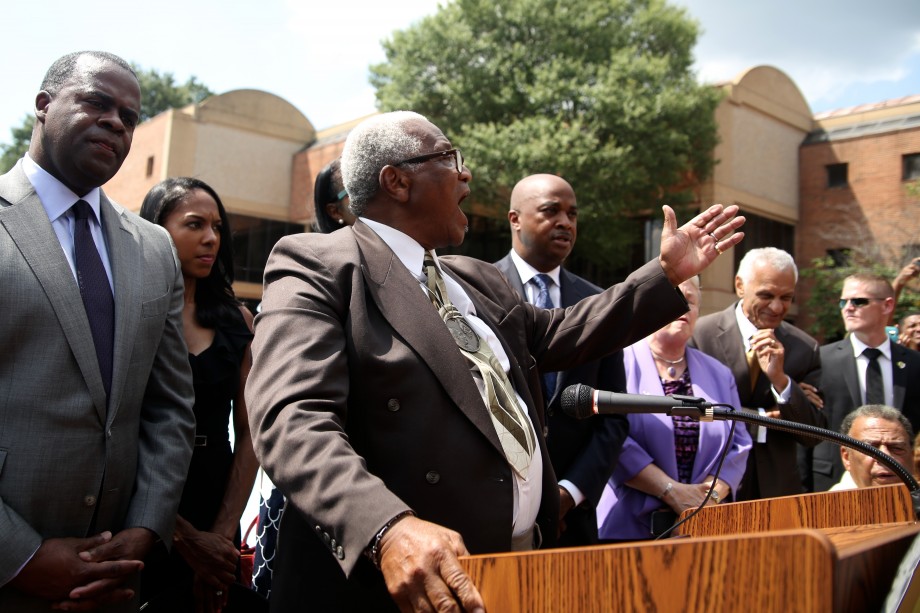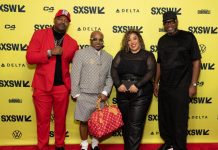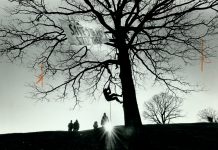
Max Blau
At 3 o’clock this afternoon, Julian Bond’s family scattered the civil rights icon’s ashes into the Gulf of Mexico, one week after he passed away at age 75. Hundreds of miles to the north, nearly 200 people simultaneously gathered in Sweet Auburn as local officials, activists, and onlookers—some of whom were his closest friends—laid a floral wreath in the reflecting pool outside the King Center to pay tribute to his legacy.
The ceremony, held at the encouragement of the Bond family, brought together Atlanta mayors (Andrew Young, Kasim Reed), local officials (State Sen. Nan Orrock, Councilman Kwanza Hall), and civil rights leaders (C.T. Vivian, Bill Harris) for a moment of silence and a chance to remember Bond—co-founder of the Student Nonviolent Coordinating Committee, a longtime state lawmaker, and a former NAACP chairman.
“Julian was always, as he said, a ‘race man,’” said Young, who served with Bond in the General Assembly in the ‘70s before becoming a U.N. Ambassador. “But that’s only partially true. He was a race man because he was concerned about the plight of black people. But he understood we were a minority, and that in order to bring about changes for the good of the race, he had to be concerned about the human race.”
According to Young, Bond’s inclusive approach to human rights was aided by a cool temperament and sharp sense of humor, both of which furthered his impact as a leader in the Civil Rights Movement. (Young recited a two-line poem Bond wrote in 1960: “Look at that girl shake that thing/We can’t all be Martin Luther King.”) Acclaimed author Taylor Branch, a longtime friend and chronicler of the movement, said Bond wanted to be remembered as a freedom fighter and as someone who could find humor in the darkest of moments.
“He was proud of being easily amused, even in the midst of terrible injustices,” Branch said. “He should be remembered for that.”

Max Blau
During his life, Bond used his breadth of experiences to educate thousands of students at the University of Virginia and to take people on civil rights tours throughout the South to help them understand the struggle of the ‘60s. For Orrock, a former SNCC volunteer, those lessons began in the summer of 1964 as she came to know Bond when he worked as the organization’s communications director. To this day, she says, the former state lawmaker has improved the lives of others through “his unwavering commitment to fight for justice” and his insistence to “always be current” as he championed civil rights for all people—most recently for the LGBT community.
“He did not live in the past,” Orrock said. “He’s helped hold up the bloodstained freedom banner going forward.”
Growing up four houses down from Bond’s family on Sunset Avenue in Vine City, Martin Luther King III—the oldest son of Rev. Martin Luther King Jr.—remembered watching Bond leave his house to commute to the Gold Dome, where he used his charisma to slowly thaw icy racial relations in a building where lawmakers tried to prevent him from public service. In Bond’s honor, King III said, people now have a responsibility to fight until “freedom and justice and equality exist for all human kind.” Making a rare public appearance to offer benediction, 91-year-old C.T. Vivian, one of King Jr.’s right hand men during the ‘60s, echoed the call to keep pushing for lasting civil rights progress.
“If we stop now, it would not be good enough, because Julian wanted to be here when the great change came,” Vivian says. “Martin Luther King [Jr.] wanted to be here when the great change came. I don’t want to die yet. It’s not because I want a long life, it’s because I hope I would be here when the real change comes.”













